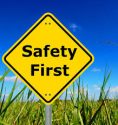
How to Detect Propane Leaks
In its natural state, propane is colorless and odorless. However, to make it easier to detect gas leaks, a chemical compound is deliberately added to the gas in order to emit a strong, unpleasant odor in the event of a leak, alerting homeowners to take action. You can liken the smell of propane gas to rotten eggs, a dead animal or skunk’s spray.
What Should I do if I Smell Gas?
- Avoid any kind of spark or flame by refraining from use of cell or telephones, appliances, lighters, light switches—all of which can create a dangerous explosion
- Leave the area immediately
- Shut off the gas at the main valve (right or clockwise) only if you feel that it is safe to do so
- Call your local gas company, propane retailer, fire department or 911 to report the leak from a neighbor’s house or from a safe distance from the leak
- Return to your home only when a qualified technician has given safety clearance
- Inspect and repair system before resuming normal use
REMEMBER PROPANE GAS IS HIGHLY FLAMMABLE
When mixed with oxygen, propane can ignite from otherwise innocuous sources such as: static electricity and electrical sparks. Obvious culprits are lit cigarettes and open flames. Since propane is heavier than air, gas will often accumulate in lower spaces like along floors or in basements.
If you smell gas, EXTINGUISH all smoking materials and open flames immediately, and LEAVE THE AREA!
Can Everyone Smell a Gas Leak?
Certain people may have trouble smelling propane gas, such as older folks on various medications, those with sinus problems, smokers and drinkers. Rust, air or water on the inside of your tank or cylinder can also reduce the effectiveness of the odor, resulting in “Odor Fade,” making leaks difficult to detect. Therefore, it is important to take immediate and appropriate measures even if you detect the slightest gas odor.
Propane Gas Detectors
As an extra security measure, Propane Gas Detectors sound an alarm when gas is present. If smell is not your strongest sense, you may want to purchase one or two of these detectors to place in areas where you use or store propane gas.
When purchasing your Propane Gas Detector…
- Buy units that are listed by Underwriters Laboratories (UL) to insure the best quality.
- Follow the manufacturer’s instructions regarding installation and regular maintenance.
- Always act on the smell of gas whether or not your alarm sounds.
Periodic Inspections of your Propane Systems are always a Good Idea
Other Propane Safety Precautions to Consider
- Do Not Lock the Tank Lid: Since the valve is located under the lid, you want to have immediate access in case of an emergency. The lid merely protects valves and fittings from the environment.
- Do Not Use Outdoor Propane Appliances Indoors: Barbecue grills, propane heaters, and portable generators can cause carbon monoxide poisoning when used improperly in closed spaces, which may result in death. Only use heating appliances that have been approved for indoor use.
- Paint in Light Colors: Should you decide to paint your tank, only use light colors, as dark colors result in built-up pressure and can discharge the valve. Avoid painting caps, valves or regulators.
Call before you dig
Before you dig on your property, please call the Diggers Hotline 811/1-800-227-2600 to help you find the underground lines of all types located on your property. The size and location of your gas system may require compliance with federal, state, or local laws. For example, underground lines that run under a public place may require that you register with the Digger’s Hotline/”One-Call” Program in your state.

